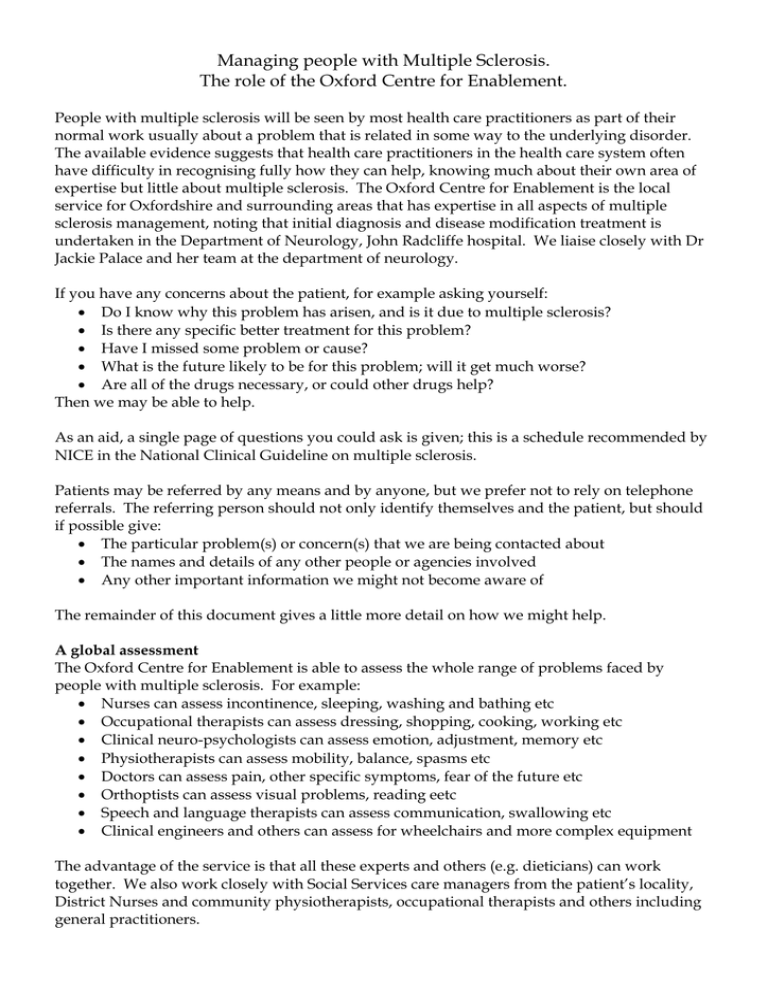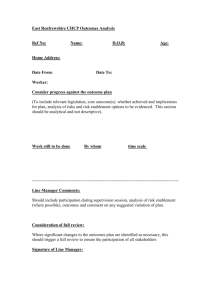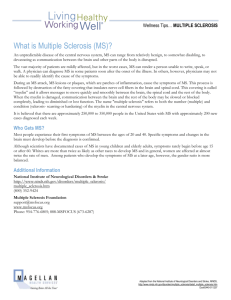Managing people with Multiple Sclerosis.
advertisement

Managing people with Multiple Sclerosis. The role of the Oxford Centre for Enablement. People with multiple sclerosis will be seen by most health care practitioners as part of their normal work usually about a problem that is related in some way to the underlying disorder. The available evidence suggests that health care practitioners in the health care system often have difficulty in recognising fully how they can help, knowing much about their own area of expertise but little about multiple sclerosis. The Oxford Centre for Enablement is the local service for Oxfordshire and surrounding areas that has expertise in all aspects of multiple sclerosis management, noting that initial diagnosis and disease modification treatment is undertaken in the Department of Neurology, John Radcliffe hospital. We liaise closely with Dr Jackie Palace and her team at the department of neurology. If you have any concerns about the patient, for example asking yourself: • Do I know why this problem has arisen, and is it due to multiple sclerosis? • Is there any specific better treatment for this problem? • Have I missed some problem or cause? • What is the future likely to be for this problem; will it get much worse? • Are all of the drugs necessary, or could other drugs help? Then we may be able to help. As an aid, a single page of questions you could ask is given; this is a schedule recommended by NICE in the National Clinical Guideline on multiple sclerosis. Patients may be referred by any means and by anyone, but we prefer not to rely on telephone referrals. The referring person should not only identify themselves and the patient, but should if possible give: • The particular problem(s) or concern(s) that we are being contacted about • The names and details of any other people or agencies involved • Any other important information we might not become aware of The remainder of this document gives a little more detail on how we might help. A global assessment The Oxford Centre for Enablement is able to assess the whole range of problems faced by people with multiple sclerosis. For example: • Nurses can assess incontinence, sleeping, washing and bathing etc • Occupational therapists can assess dressing, shopping, cooking, working etc • Clinical neuro-psychologists can assess emotion, adjustment, memory etc • Physiotherapists can assess mobility, balance, spasms etc • Doctors can assess pain, other specific symptoms, fear of the future etc • Orthoptists can assess visual problems, reading eetc • Speech and language therapists can assess communication, swallowing etc • Clinical engineers and others can assess for wheelchairs and more complex equipment The advantage of the service is that all these experts and others (e.g. dieticians) can work together. We also work closely with Social Services care managers from the patient’s locality, District Nurses and community physiotherapists, occupational therapists and others including general practitioners. Assessments may be undertaken in many ways, and often several are needed: • Home visits; we try to see everyone at home early in the process • Out-patient; this is especially for a medical assessment, but can be for any profession • Day-patient; suitable for people relatively nearby and not liable to becoming fatigued by travel • In-patient; we tend to have planned five-day (four-night) stays, Monday to Friday Case management and setting goals One frequent complaint from patients is that they are seeing many people who do not work together or communicate. One specific role we undertake, after a global assessment, is developing an integrated plan of management over the next few months and identifying who may be best at executing different parts of the plan. This is particularly needed for people with complex problems, and is not necessary for people with single or straightforward problems. We thus often contact different community services and arrange a case conference to discuss the situation and advise on potential ways forward. Rehabilitation treatments The Oxford Centre for Enablement has particular expertise in neurological rehabilitation treatments and if a patient requires combined and coordinated input from two or more professions, or access to special equipment then treatment here on a day-patient or in-patient basis is needed. However there are many healthcare professionals in the community with appropriate expertise and if they are able to satisfy the patient’s need then we will liaise with them and transfer care back. The range of treatments is large, ranging from hands-on therapies, through drugs and equipment and on to teaching families and giving information and emotional support. Long-term monitoring and support Many of our patients are vulnerable adults and need fairly formal monitoring of their situation and this is one role for the OCE. We arrange regular planned reviews at a frequency and intensity that is appropriate for the particular patient. This may be as infrequently as once a year. It may occur on a day-patient or in-patient basis. We also follow the NICE recommendation that patients should be able to self-refer back at any time, and thus we tend to discharge many patients back to community services rather than arranging ongoing review provided their problems are likely to be within the expertise of local services. Dr Derick T Wade, Consultant and Professor in Neurological Rehabilitation Oxford Centre for Enablement, Windmill Road, OXFORD OX3 7LD Tel: +44 - (0)1865 - 737310 (direct); - 737306 (secretary) Fax: +44 – (0)1865 – 737309 (for referrals) Email: derick.wade@noc.nhs.uk (personal) or oce@noc.nhs.uk (for referrals) Review checklist This is not a list of questions to be asked of every person with MS on every occasion. It is a list to remind clinicians of the wide range of potential problems that people with MS may face, and which should be actively considered as appropriate. A positive answer should lead to more detailed assessment and management Initial question It is best to start asking an open-ended question such as: “Since you were last seen or assessed has any activity you used to undertake been limited, stopped or affected?” Activity domains Then, especially if nothing has been identified, it is worth asking questions directly, choosing from the list below those appropriate to the situation based on your knowledge of the person with MS: “Are you still able to undertake, as far as you wish: • vocational activities (work, education, other occupation)? • leisure activities? • family roles? • shopping and other community activities? • household and domestic activities? • washing, dressing, using toilet? • getting about (either by walking or in other ways) and getting in and out of your house? • controlling your environment (opening doors, switching things on and off, using the phone)?” If restrictions are identified, then the reasons for these should be identified as far as possible considering impairments (see below), and social and physical factors (contexts). Common impairments It is worth asking about specific impairments from the list below, again adapting to the situation and what you already know: “Since you were last seen have you developed any new problems with: • fatigue, endurance, being overtired? • speech and communication? • balance and falling? • chewing and swallowing food and drink? • unintended change in weight? • pain or painful abnormal sensations? • control over your bladder or bowels? • control over the movement? • vision and your eyes? • thinking, remembering? • your mood? • your sexual function or partnership relations? • how you get on in social situations?” Final question Finally, it is always worth finishing with a further open-ended question: “Are there any other new problems that you think might be due to MS that concern you?”.




